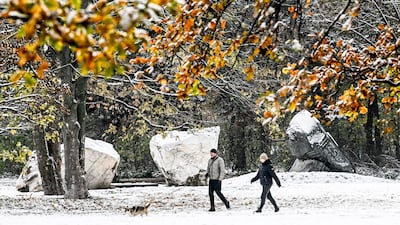The cold season has arrived in Germany, and everyone from bus drivers to hotel bosses has noticed.
After a warm October that felt like May, temperatures have plunged in recent days, with Berlin sprinkled in snow for the first time this winter.
It is the moment Germany has dreaded for months as a winter of scarce gas supplies sets in.
As hats, scarves and puffer jackets come out, the sun sets at 4.30pm and hot drinks menus appear at Christmas markets, temptation to turn on the heating is rising.
An energy-saving drive paid dividends in the autumn, and Germany is armed with a new gas terminal built in record time.
But energy costs remain high, and many businesses wonder how they will survive an expensive winter.
Even hotel guests have been told not to take their eye off the ball while they relax on holiday.
“If you only take a three-minute shower at home, then maybe you could do the same with us,” Detlef Schroeder, who owns a three-star hotel between Bremen and Hamburg, told The National.
For the hospitality sector, it is another anxious winter after two years of coronavirus restrictions.
In the state of Lower Saxony, one in five hotel and restaurant owners fear closure this winter, a survey found.
Mr Schroeder, who is also the president of an industry lobby group in the region, said some customers already seemed reluctant to spend money.
“Many colleagues are even less certain now than during the coronavirus crisis whether their businesses will survive 2023,” he said at a meeting in Aurich.

In the market square nearby, workers were draping a Christmas tree in lights — which will run to eight kilometres around the town.
The famous Christmas markets with their hot dog stands, gingerbread hearts, mulled wine booths and children’s games are popping up all over Germany.
But some are trimming their opening hours to save energy, following in the footsteps of shops who have dimmed their lights.
At a shopping centre in Wilhelmshaven, shops get only six hours, from 4pm to 10pm, to show off illuminated adverts.
Some escalators and lifts are out of action to save power, and doors from the high street will be kept closed.
Retailers are meanwhile expecting a decline in Christmas shopping, with one theory circulating that work parties will only go ahead if the boss is paying.
Inflation last week reached a peak of 10.4 per cent, the highest since 1951 in what was then West Germany.
The cost of some foods — including seasonal ones such as German Christmas goose — is rising by more than restaurants can pass to customers.
And labour shortages are not helping. Some businesses say they could have put more hay in the loft over summer if more staff had been available.
“If I know that in winter there are fewer guests, if I know what it will cost to open up and what my turnover will be, then I’ll soon be thinking about whether to close my shop,” said Rainer Balke, the manager of the regional hospitality group.
“Several are at that stage, but what’s slowing them down is that they would have to lay off their staff.”

In some towns, experts are offering clinics on how to save energy in the difficult months to come.
Practical tips include using laptops instead of desktops, washing hands with cold water and allowing food to chill at 7ºC in the fridge.
One such expert, Jens Blome, said phones were ringing regularly at advice centres as consumers look for help.
He told people to focus on the biggest possible everyday savings — with 70 per cent of household energy use coming from heating.
“It’s important to do what you can that doesn’t cost anything,” he said. “I could get someone round, but there’s a lot I can do myself.”
Hospitals are also worried about rising costs, forcing ministers to step in with up to €8 billion ($8.34bn) to prevent insolvencies.
“We are relying on them keeping their promise that no hospital will have to close because of inflation and rising energy costs,” said Josef Duellings, the head of a hospital association.
The energy squeeze has been anticipated for months as Russia first slowed its gas exports to Germany, then cut them off.
In a worst-case scenario, people could be asked to use just enough gas for bare necessities under emergency plans handed to MPs.
Chancellor Olaf Scholz’s government is stepping in with up to €200bn over two years to tame energy costs.
However, ministers have said that a price cap should not be so generous that there is no incentive to save energy.
The government has taken out adverts with the motto “every step counts” to encourage frugality this winter.
Landmarks such as Berlin’s Brandenburg Gate are being dimmed and temperatures at public swimming pools have been turned down.
The saving efforts have paid off so far, after temperatures in October rose to 3.1°C warmer than average since reunification in 1990.
It helped Germany to declare last week that its gas storage tanks were 100 per cent full after months of stocking up.
And there was more good news last Tuesday as a gas terminal in Wilhelmshaven was declared ready after 194 days of construction.
It means Germany can tap directly into the global market for liquefied natural gas rather than relying on neighbours.
But “even a couple of cold days can be enough for consumption to rise and storage tanks to empty quickly,” said Klaus Mueller, the head of Germany’s power grid regulator.
In an unusual joint statement with Germany’s weather service, he said a 20 per cent cut in consumption was needed but that a relatively mild winter might make it possible.
“Frugality is the order of the day, even in mild temperatures,” he said.


